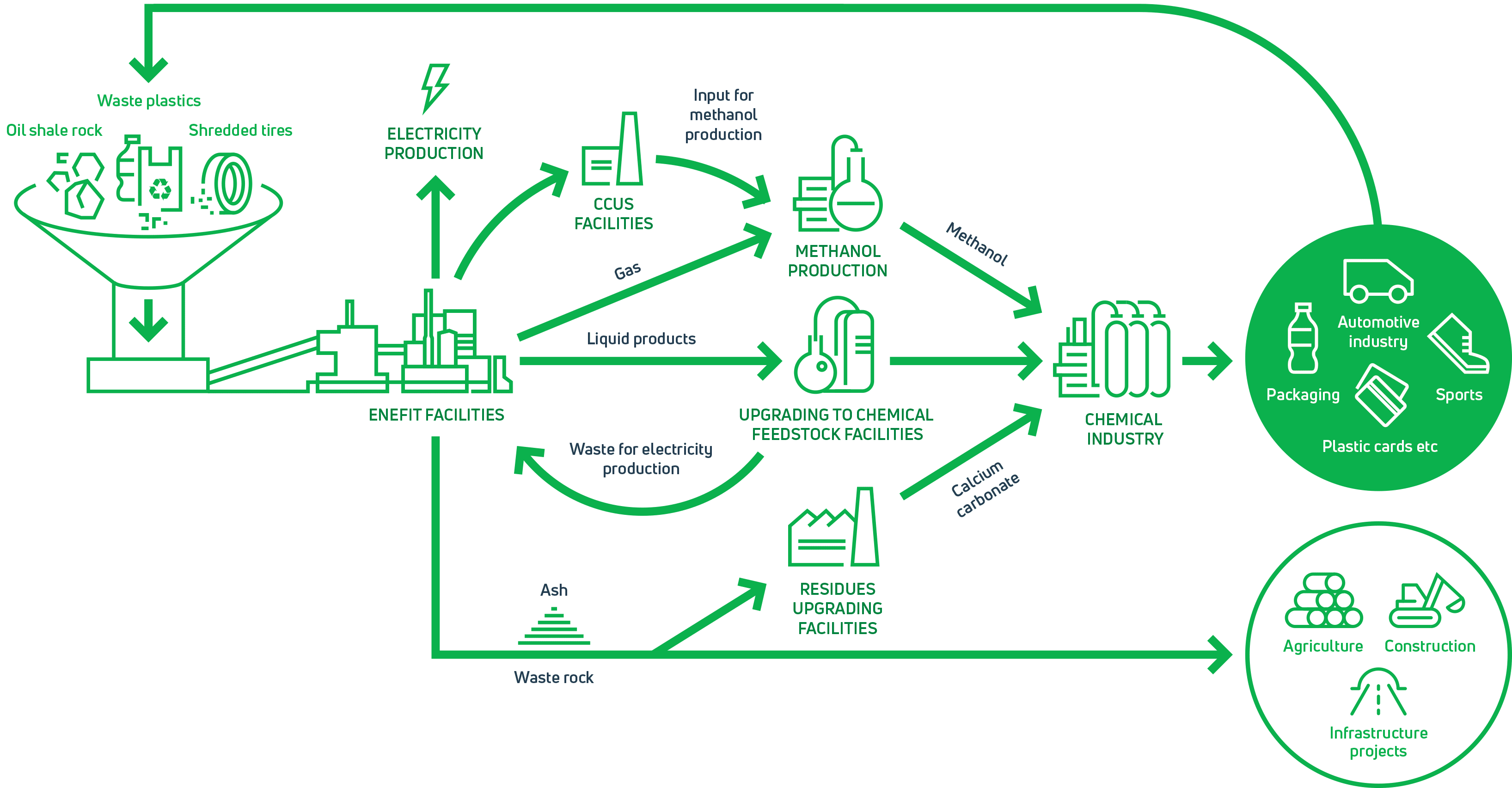Carbon-neutral chemical industry
We help reduce environmental problems
Millions of tons of non-recyclable waste plastics and waste tyres are generated in Europe every year, which are burned or landfilled due to the lack of recycling options. This is a huge burden on the environment.
Our decades of experience and unique know-how allow us to reprocess such waste together with oil shale in Enefit's pyrolysis plants and to produce chemical products needed for the manufacture of consumer goods. Plastics that become trash become a raw material for us again. This creates a closed circle.
Our chemical industry based on the circular economy will be almost completely waste-free, as the by-product of each stage will be a raw material for a next product, including CO₂. The transition to a chemical industry also means new competence, well-paid jobs and income for both Ida-Virumaa and the whole of Estonia.

Interesting reading
Eesti Energia is going to solve Estonia’s problem with waste tyres together with Ragn-Sells
23.12.2022
Eesti Energia received support from the state for the development of pumped-storage hydroelectric power plant
28.10.2022
Eesti Energia has identified the best CO₂ capture technologies
21.10.2022
Eesti Energia is preparing the construction of a pumped-storage hydroelectric power plant to help ensure energy security
09.08.2022
We solve important challenges
We help reduce global warming
and catch CO₂.
We solve the problem of waste.
We will soon be able to process all waste plastics and waste tyres generated in the Baltic States.
Jobs in Ida-Virumaa will be preserved,
the competitiveness of the region will increase and unique competence will be developed.
We increase income for our company, Ida-Virumaa, and the state.
We develop skills and technology
that can be exported.
We have identified technologies for CO₂ capture
A study conducted together with TalTech has selected two technologies with the greatest potential to capture carbon from Eesti Energia's pyrolysis plants. The next step is to choose the most suitable among them together with technology providers and to find the best ways to use the captured CO₂ in the future with research and development partners.

We solve the problem of waste plastics
47.5 million tons of plastic waste is generated annually in Europe, of which 65% is burned for energy production or deposited in landfills. Enefit's technology enables the processing of hundreds of thousands of tons of waste plastics per year that cannot be recycled in any other way. Such as waste consisting of several different plastic materials and plastics that are very dirty.
We turn waste, which causes many environmental problems, into a valuable resource, thus reducing the share of oil shale in production. We plan to start the industrial use of waste plastics in 2024, but we will start reprocessing waste tyres before that. At full capacity, Enefit could turn all the waste plastics and tyres generated in the Baltic States into new useful products, that is hundreds of thousands of tons of garbage that would otherwise be deposited in landfills or burned in furnaces with a large carbon footprint.

4 exciting facts
Research in cooperation with the Oil Shale Competence Centre of Tallinn University of Technology has proven that Enefit's pyrolysis plants are suitable for reprocessing various plastic mixtures.
Only quite clean waste consisting of one type of plastic can be recycled in the conventional (mechanical) way. Enefit's pyrolysis plants enable the processing of mixed plastic waste as well, which currently needs to be burned or landfilled.
Plastics contain over three times more oil than oil shale. Their use as raw materials for the chemical industry contributes to reducing petroleum production.
CO₂ can become an opportunity instead of a problem. Our aim is to turn CO₂ into a valuable resource from which various chemical products can be made.